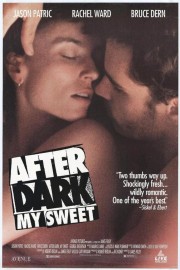After Dark, My Sweet
**This piece was written during the 2023 SAG-AFTRA strike. Without the labor of the actors currently on strike, the movies being covered here wouldn’t exist.
The release of Kino Lorber’s new Blu-Ray of James Foley’s 1990 neo-noir on September 12, 2023, seemed as good a time as any to actually watch the film for myself for the first time. The screenplay is adapted from the 1955 novel by Jim Thompson, but the film feels like Ulmer’s classic noir, “Detour,” which has a down-on-his-luck guy who gets himself roped in with a femme fatale who feels like trouble the second he sees her. This certainly has more to the story than that does, but when Jason Patric first meets Rachel Ward, that was the comparison I made right away.
Some composers were just built to score film noir, or at least, dangerous thrillers. Jerry Goldsmith, John Ottman, Max Steiner, and in this film’s case, Maurice Jarre. The Oscar-winner for David Lean epics has a use of synthesizers, or at least otherworldly sounds, that works just right for movies like this and Peter Weir’s “Year of Living Dangerously.” There’s something to his sound that brings out the emotions and the tensions of this story that- upon re-listen- makes me wish he had lived, and worked, long enough to collaborate with Foley on his “Fifty Shades” sequels. Imagine this approach to those progressively more suspenseful stories.
The first character in this film we are introduced to is Collie (Patric), who comes into a bar from the road for a drink. A former boxer, he has been in and out of mental institutions, but he seems amiable enough. He’s friendly to Fay (Ward’s character), but the bartender still wants to kick him out. Fay, however, sees an opportunity. She follows him, and picks him up on the side of the road. She has a chance for him to make some money, and with an older man named Uncle Bud (Bruce Dern), it begins fairly quickly how much three is a crowd.
The deeper than Collie gets in with Fay- a divorcee- and Uncle Bud, the more we see of someone who goes by Doc Goldman (George Dickerson). He’s concerned about Collie, and possibly more, but he doesn’t really offer anything Collie wants, even sage advice to try and help him. The scenes between Patric and Dickerson are probably the most honest ones in the movie in terms of people giving each other a genuine connection; especially as things with Fay and Uncle Bud progress, the dynamics shift, especially when it comes to the actual moneymaking opportunity, which is a way to make money.
Foley keeps the film off-balance in a way that is refreshing in film noir, and you’ve probably seen more of his films than you expect, not just the “Fifty Shades” films or “Glengarry GlenRoss” but “The Chamber,” “Fear,” “Confidence” or “The Corruptor.” Foley’s interests lie in following people in dangerous, high-stakes situations, and even if not all of those films are wholly successful in the same way “After Dark” ends up being, we feel the fact that there’s someone with real ideas he wants to explore at work in all of them.
The final 20-30 minutes of this film are a masterful slow-burn, as choices made earlier in the film are paid off, and real motivations are revealed. The second a cop comes up to their car as they are waiting outside a bank, you know nothing is going to go as planned again. The film’s conclusion makes it so jarring that it shifts to Jarre’s score, with its lush sounds, over the credits, but I was hooked in, and am looking forward to not only watching this again in the future, but maybe even diving in to the disc’s audio commentary with Foley and interviews with Patric and Dern. Like a good noir, this one sticks with you.










